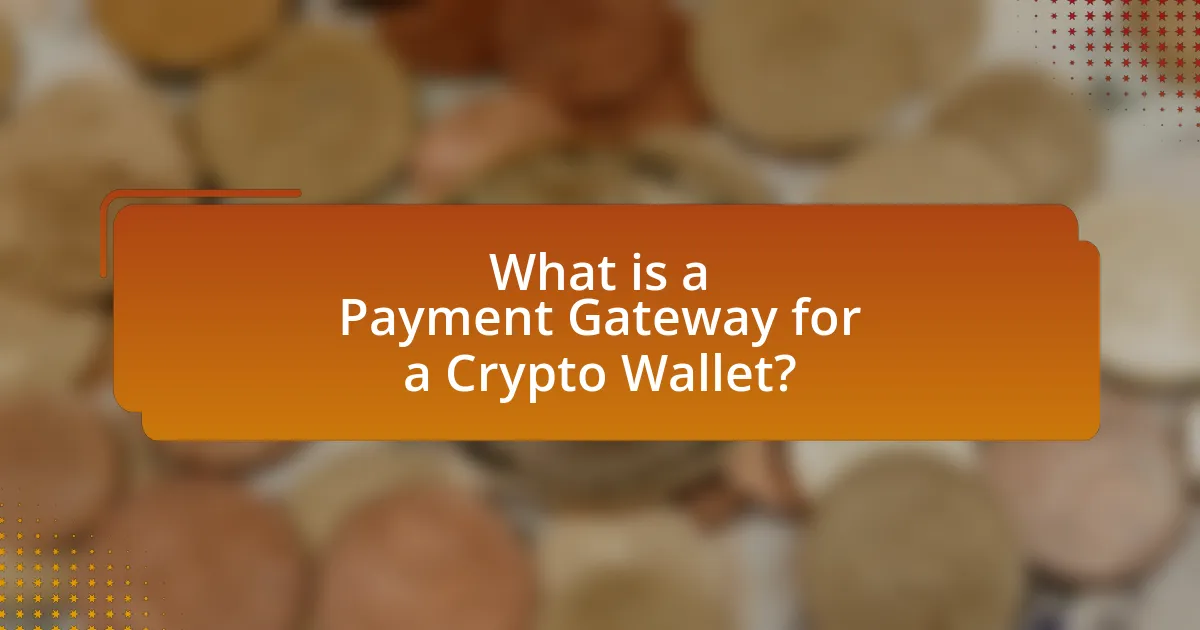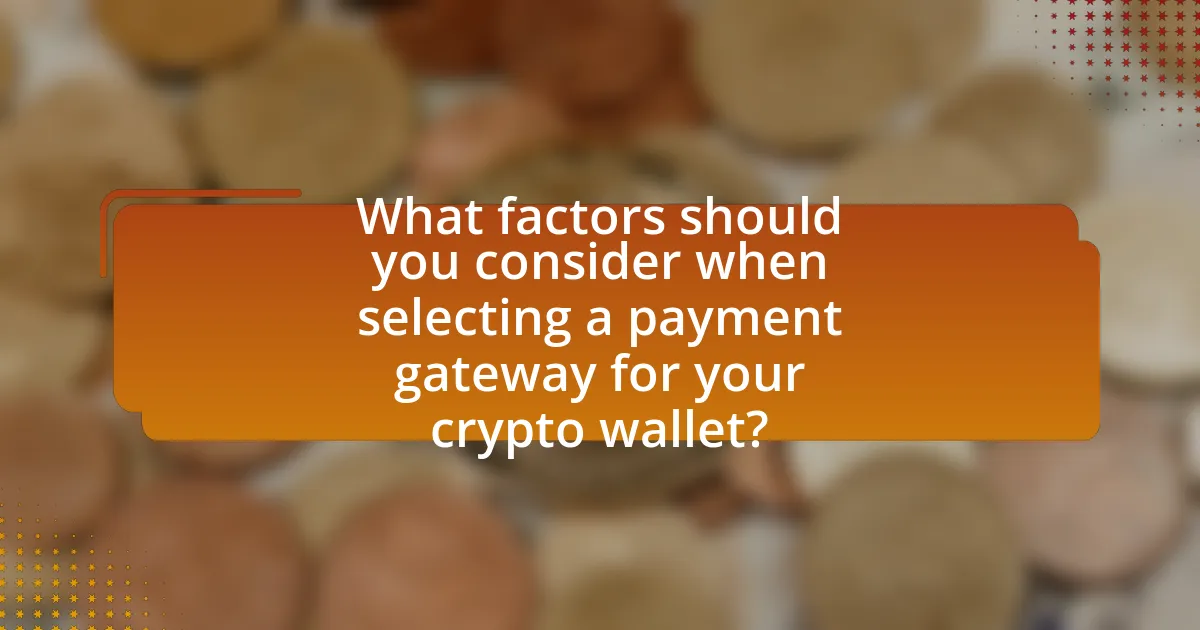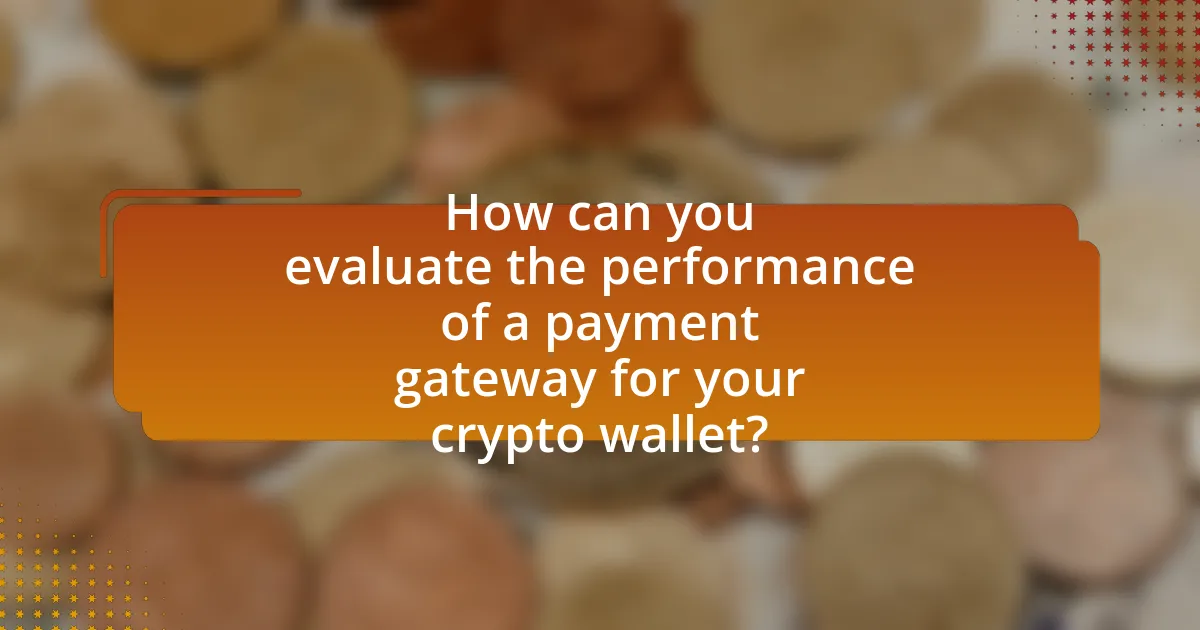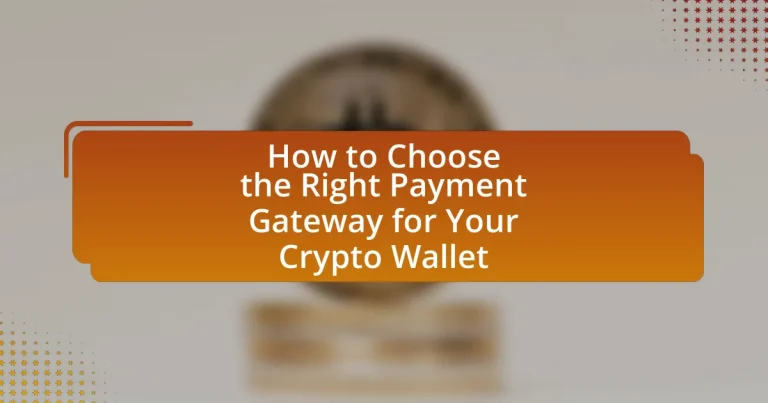A payment gateway for a crypto wallet is a crucial service that enables the processing of cryptocurrency transactions between buyers and sellers, facilitating payments in digital currencies while ensuring security and integration with e-commerce platforms. This article outlines the functionality of payment gateways, their key components, and the importance of selecting the right one for enhancing transaction speed, security, and user experience. It also discusses the risks associated with inadequate gateways, factors to consider when choosing a gateway, and best practices for ensuring secure and efficient transactions. Additionally, the article evaluates performance metrics and customer support options that contribute to a reliable payment processing experience in the cryptocurrency ecosystem.

What is a Payment Gateway for a Crypto Wallet?
A payment gateway for a crypto wallet is a service that facilitates the processing of cryptocurrency transactions between buyers and sellers. This technology enables users to make payments using digital currencies, converting them into fiat currency or directly processing the cryptocurrency for the merchant. Payment gateways for crypto wallets often include features such as transaction security, fraud prevention, and integration with various e-commerce platforms, ensuring a seamless experience for both parties involved in the transaction.
How does a payment gateway function in the context of cryptocurrency?
A payment gateway in the context of cryptocurrency functions as an intermediary that facilitates the transfer of digital currency between a buyer and a seller. It securely processes cryptocurrency transactions by converting the digital currency into fiat currency or directly transferring it to the merchant’s wallet, depending on the gateway’s capabilities. Payment gateways utilize blockchain technology to ensure transaction security and transparency, allowing for real-time verification and settlement of payments. For instance, platforms like BitPay and Coinbase Commerce enable merchants to accept Bitcoin and other cryptocurrencies, providing features such as automatic conversion to local currency and fraud protection, which enhances the overall transaction experience.
What are the key components of a payment gateway for crypto transactions?
The key components of a payment gateway for crypto transactions include transaction processing, security features, user interface, integration capabilities, and support for multiple cryptocurrencies. Transaction processing ensures the swift and accurate handling of crypto payments, while security features like encryption and fraud detection protect against unauthorized access and cyber threats. A user-friendly interface enhances the customer experience, making it easier for users to complete transactions. Integration capabilities allow the payment gateway to connect seamlessly with existing e-commerce platforms and wallets. Finally, support for multiple cryptocurrencies enables businesses to cater to a broader audience by accepting various digital currencies, which is essential given the diverse landscape of cryptocurrencies available today.
How do these components interact with a crypto wallet?
Components such as payment gateways, APIs, and blockchain networks interact with a crypto wallet by facilitating transactions, enabling communication, and ensuring security. Payment gateways process cryptocurrency transactions by connecting the wallet to various payment methods, allowing users to send and receive funds seamlessly. APIs serve as intermediaries that enable the wallet to communicate with external services, such as exchanges or merchant platforms, ensuring real-time updates and transaction confirmations. Blockchain networks provide the underlying infrastructure that records and verifies transactions, ensuring that the wallet’s balance is accurate and secure. This interaction is crucial for the functionality of a crypto wallet, as it relies on these components to operate efficiently and securely in the cryptocurrency ecosystem.
Why is choosing the right payment gateway important for crypto wallets?
Choosing the right payment gateway is crucial for crypto wallets because it directly impacts transaction speed, security, and user experience. A suitable payment gateway ensures that cryptocurrency transactions are processed quickly and securely, minimizing the risk of fraud and enhancing customer trust. For instance, gateways that support multiple cryptocurrencies and offer robust security measures, such as encryption and two-factor authentication, can significantly reduce vulnerabilities. Additionally, the right gateway can facilitate seamless integration with various platforms, improving overall functionality and user satisfaction.
What risks are associated with using an inadequate payment gateway?
Using an inadequate payment gateway poses several risks, including security vulnerabilities, transaction failures, and compliance issues. Security vulnerabilities can lead to data breaches, exposing sensitive customer information, as evidenced by the 2019 Capital One breach that affected over 100 million customers due to inadequate security measures. Transaction failures can result in lost sales and customer dissatisfaction, as unreliable gateways may not process payments correctly, leading to abandoned carts. Compliance issues arise when gateways do not adhere to regulations such as PCI DSS, which can result in hefty fines and legal repercussions for businesses. These risks highlight the importance of selecting a robust payment gateway to ensure secure and efficient transactions.
How can the right payment gateway enhance user experience?
The right payment gateway enhances user experience by providing seamless transactions, which reduces friction during the payment process. A user-friendly interface, fast processing times, and multiple payment options contribute to a smoother checkout experience. For instance, studies show that 70% of users abandon their carts due to complicated payment processes, highlighting the importance of an efficient gateway. Additionally, secure payment options build trust, as 61% of consumers are more likely to complete a purchase when they feel their payment information is safe. Thus, selecting an appropriate payment gateway directly impacts user satisfaction and conversion rates.

What factors should you consider when selecting a payment gateway for your crypto wallet?
When selecting a payment gateway for your crypto wallet, consider transaction fees, security features, supported cryptocurrencies, integration capabilities, and customer support. Transaction fees can vary significantly between gateways, impacting overall costs for users. Security features, such as two-factor authentication and encryption, are crucial for protecting sensitive financial information. Supported cryptocurrencies determine the flexibility of the payment gateway, as some may only accept a limited range of digital assets. Integration capabilities with existing systems or platforms can streamline operations, making it easier to manage transactions. Lastly, reliable customer support is essential for resolving issues quickly and efficiently, ensuring a smooth user experience.
How do transaction fees impact your choice of payment gateway?
Transaction fees significantly influence the selection of a payment gateway by directly affecting the overall cost of transactions. High transaction fees can erode profit margins, making certain gateways less appealing for businesses that prioritize cost efficiency. For instance, if a payment gateway charges a 3% fee on transactions, a business processing $10,000 would incur $300 in fees, which could be substantial for smaller operations. Conversely, a gateway with lower fees, such as 1%, would only cost $100 for the same transaction amount, allowing businesses to retain more revenue. Therefore, when evaluating payment gateways, it is crucial to compare transaction fees to ensure that the chosen option aligns with financial goals and operational sustainability.
What are the typical fee structures for different payment gateways?
Typical fee structures for different payment gateways include transaction fees, monthly fees, and setup fees. For instance, PayPal generally charges a transaction fee of 2.9% plus $0.30 per transaction, while Stripe has a similar structure with a 2.9% fee plus $0.30. Square charges 2.6% plus $0.10 per transaction. Some gateways, like Authorize.Net, may also impose a monthly fee of around $25 in addition to transaction fees. These fee structures can vary based on transaction volume, type of business, and specific agreements with the payment processor.
How can high fees affect your overall crypto transactions?
High fees can significantly reduce the profitability of your overall crypto transactions. When transaction fees are elevated, they consume a larger portion of the funds being transferred, which can deter users from making smaller transactions or lead to losses on trades. For instance, during periods of network congestion, fees can spike dramatically; in 2021, Bitcoin transaction fees reached an average of $62, impacting users’ willingness to transact. Consequently, high fees can limit market participation and hinder the adoption of cryptocurrencies as a viable payment method.
What security features should a payment gateway offer?
A payment gateway should offer robust security features such as encryption, tokenization, fraud detection, and compliance with Payment Card Industry Data Security Standards (PCI DSS). Encryption protects sensitive data during transmission, while tokenization replaces sensitive information with unique identifiers, minimizing exposure. Fraud detection systems analyze transaction patterns to identify and prevent suspicious activities. Compliance with PCI DSS ensures that the payment gateway adheres to industry standards for safeguarding cardholder information, which is critical for maintaining trust and security in financial transactions.
How do encryption and fraud protection play a role in security?
Encryption and fraud protection are critical components of security in digital transactions, particularly in the context of payment gateways for crypto wallets. Encryption safeguards sensitive information, such as personal data and financial details, by converting it into a coded format that is unreadable without the appropriate decryption key. This process prevents unauthorized access and data breaches, which are prevalent in online transactions. For instance, the use of Advanced Encryption Standard (AES) is widely recognized for its effectiveness in securing data.
Fraud protection mechanisms, such as transaction monitoring and anomaly detection, further enhance security by identifying and mitigating fraudulent activities in real-time. These systems analyze transaction patterns and flag suspicious behavior, thereby reducing the risk of financial loss. According to a report by the Federal Trade Commission, consumers lost over $3.3 billion to fraud in 2020, highlighting the necessity of robust fraud protection measures.
Together, encryption and fraud protection create a multi-layered security framework that not only protects user data but also fosters trust in digital payment systems, making them essential for secure crypto wallet transactions.
What are the best practices for ensuring the security of your transactions?
To ensure the security of your transactions, utilize strong encryption methods and secure payment gateways. Strong encryption protects sensitive data during transmission, while reputable payment gateways often employ advanced security measures such as two-factor authentication (2FA) and fraud detection systems. According to a report by the Ponemon Institute, organizations that implement encryption can reduce the risk of data breaches by up to 80%. Additionally, regularly updating software and monitoring transaction activity can help identify and mitigate potential threats, further enhancing transaction security.

How can you evaluate the performance of a payment gateway for your crypto wallet?
To evaluate the performance of a payment gateway for your crypto wallet, analyze key metrics such as transaction speed, fees, security features, and user experience. Transaction speed is critical; a gateway should process transactions quickly to enhance user satisfaction. Fees should be competitive, as high costs can deter users; for instance, some gateways charge up to 3% per transaction. Security features, including encryption and fraud detection, are essential to protect users’ funds, with reputable gateways often employing advanced security protocols. Lastly, assess user experience through reviews and ease of integration, as a seamless interface can significantly impact user retention.
What metrics should you use to assess payment gateway performance?
To assess payment gateway performance, key metrics include transaction success rate, transaction speed, chargeback rate, and fees. The transaction success rate indicates the percentage of successful transactions compared to attempted ones, reflecting reliability; a high success rate is typically above 95%. Transaction speed measures the time taken to process payments, with faster gateways enhancing user experience, ideally under three seconds. The chargeback rate, which should remain below 1%, indicates the frequency of disputes and can affect merchant accounts. Lastly, fees encompass transaction costs and monthly charges, impacting overall profitability; lower fees are generally preferable for businesses. These metrics collectively provide a comprehensive view of a payment gateway’s effectiveness and efficiency.
How does transaction speed affect user satisfaction?
Transaction speed significantly impacts user satisfaction by directly influencing the efficiency and convenience of financial interactions. Users expect quick transaction confirmations, and delays can lead to frustration and a negative perception of the service. Research indicates that 70% of users abandon transactions if they take longer than a few minutes, highlighting the critical nature of speed in maintaining user engagement and satisfaction. Faster transaction speeds enhance the overall user experience, fostering trust and encouraging repeat usage of the payment gateway.
What role does uptime play in the reliability of a payment gateway?
Uptime is critical to the reliability of a payment gateway, as it directly affects the system’s availability for processing transactions. A payment gateway with high uptime ensures that merchants can consistently accept payments without interruptions, which is essential for maintaining customer trust and satisfaction. For instance, a payment gateway that operates at 99.9% uptime translates to only about 8.76 hours of downtime annually, minimizing the risk of lost sales and negative customer experiences. In contrast, lower uptime percentages can lead to frequent outages, resulting in transaction failures and potential revenue loss, thereby undermining the overall reliability of the payment processing system.
What customer support options should you look for in a payment gateway?
When selecting a payment gateway, look for customer support options that include 24/7 availability, multiple communication channels, and knowledgeable representatives. 24/7 support ensures assistance is available at any time, which is crucial for resolving issues that may arise outside of regular business hours. Multiple communication channels, such as live chat, email, and phone support, provide flexibility and convenience for users. Knowledgeable representatives are essential for effectively addressing technical questions and troubleshooting problems, as they can guide users through complex issues related to payment processing. These support features enhance user experience and build trust in the payment gateway service.
How can responsive customer support impact your experience?
Responsive customer support significantly enhances your experience by providing timely assistance and resolving issues efficiently. When customer support is responsive, users can quickly address concerns related to payment transactions, security, and technical difficulties, which is crucial in the fast-paced environment of cryptocurrency. For instance, a study by Zendesk found that 82% of customers feel more positive about a brand after a positive customer service experience. This indicates that effective support not only resolves immediate problems but also fosters customer loyalty and trust, essential for choosing a reliable payment gateway for your crypto wallet.
What types of support channels are most effective for users?
The most effective support channels for users include live chat, email support, and comprehensive knowledge bases. Live chat provides immediate assistance, which is crucial for users needing quick resolutions; studies show that 73% of customers prefer live chat for its speed. Email support allows for detailed inquiries and responses, catering to users who may require more in-depth assistance. Knowledge bases empower users to find answers independently, enhancing user satisfaction; research indicates that 67% of users prefer self-service options for resolving issues. These channels collectively enhance user experience and satisfaction in the context of choosing a payment gateway for crypto wallets.
What are the best practices for choosing a payment gateway for your crypto wallet?
The best practices for choosing a payment gateway for your crypto wallet include evaluating security features, transaction fees, supported cryptocurrencies, and user experience. Security is paramount; select a gateway that offers robust encryption and compliance with regulations to protect user data and funds. Transaction fees can vary significantly, so it is essential to compare costs across different gateways to ensure profitability. Additionally, ensure the gateway supports a wide range of cryptocurrencies to accommodate diverse user preferences. Finally, prioritize a user-friendly interface that simplifies transactions for both you and your customers, enhancing overall satisfaction.
How can you conduct thorough research before making a decision?
To conduct thorough research before making a decision, identify reliable sources of information relevant to the payment gateways for crypto wallets. Start by reviewing industry reports, user reviews, and expert analyses to gather data on features, fees, security, and user experiences. For instance, a report by Statista indicates that 60% of users prioritize security features when selecting a payment gateway. Additionally, comparing multiple options through platforms like Trustpilot can provide insights into customer satisfaction and reliability. This methodical approach ensures that the decision is informed by comprehensive and credible information.
What common mistakes should you avoid when selecting a payment gateway?
When selecting a payment gateway, avoid common mistakes such as overlooking transaction fees, neglecting security features, and failing to consider integration capabilities. Transaction fees can significantly impact your overall costs; for instance, some gateways charge up to 3% per transaction, which can accumulate quickly. Security features are crucial, as gateways with inadequate protection expose your business to fraud; a study by Verizon found that 81% of data breaches are due to weak security measures. Lastly, integration capabilities with your existing systems are essential; choosing a gateway that does not seamlessly integrate can lead to operational inefficiencies and increased workload.


